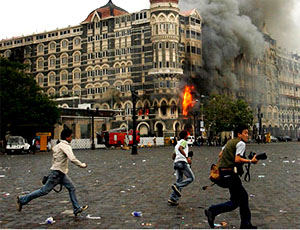Scarred but unbowed: Mumbai emerges defiant after attacks
 New Delhi - With no repairs or renovation, the walls and glass windows of Mumbai's Leopold Cafe and Chabad House remain pocked with bullet holes - constant reminders of the scars wrought upon the city people by a deadly terrorist attack a year ago.
New Delhi - With no repairs or renovation, the walls and glass windows of Mumbai's Leopold Cafe and Chabad House remain pocked with bullet holes - constant reminders of the scars wrought upon the city people by a deadly terrorist attack a year ago.
Memories of the onslaught are still fresh: Images of the smoking, blazing Taj hotel towers and terrified locals hitting the ground amid the rattle of gunfire are etched on people's minds.
Islamist militants who reached the city by boat from Pakistan unleashed carnage in India's financial capital on the night of November 26 with attacks at 10 key locations including the main railway station and two luxury hotels.
For three days the attackers from the Pakistan-based Lashkar-e-Taiba militant group fired indiscriminately, threw grenades and held hundreds hostage. By the time Indian commandos ended the siege and killed nine militants, 166 people, including 26 foreign nationals, had died.
Survival instinct is an integral part of the collective consciousness of Mumbai, no stranger to terrorist strikes. Over the past year, its inhabitants have worked to pull themselves together after the assault known locally as 26/11, and move on.
Across the metropolis, people rebuild and hope. As streets teem with life and Mumbai's trains lug impossible numbers of commuters, the sentiment in the city is sombre yet resolute.
At the iconic Taj hotel, which is due to reopen three destroyed restaurants in time for the attacks' anniversary, the general manager, 41-year-old Karambir Singh Kang, and his staff tirelessly help their guests. Kang's wife and two teenage sons died in the attack.
"I don't think the wounds will ever heal but my heart is in the hotel and the Taj is my family," Kang said.
"One has to find purpose in life. I am doing the best I can for the Taj and taking each day as it comes," he said, attributing the resilience to overwhelming support from India and abroad.
At Chhatrapati Shivaji Railway terminus where 56 people were killed, Vishnu Zende, a railway announcer, saved many lives by warning people to leave the station despite coming under fire himself. People have not forgotten the hero and visit him regularly.
Have the attacks changed Mumbai? "People's attitudes have changed. They are no longer apathetic but keenly aware of their surroundings - it shows in their alacrity when they spot unclaimed baggage," he said.
"You could even say 26/11 made them fearless. People tell me they will fight the terrorists tooth and nail when the next attack comes," Zende added.
Attack sites like the Leopold Café or the Jewish Chabad House have become landmarks and are part of several guided tours.
Yet for many who were maimed or lost loved ones, there is unending trauma.
Lalji Pande, who was caught in the crossfire and suffered a debilitating hand injury, lost his job at a paint-workshop. Unable to pay his medical bills and without a home, like many others he has yet to receive compensation.
The minority Jewish population - targeted by terrorists for the first time in India - still feels threatened.
Over the past year, the Israeli government has issued two warnings about new attacks on Jews in the city. "Mumbai is home, but our future here is bleak," said Daniel David, who lives in the Chabad House area.
Meanwhile, justice eludes the victims as a trial against Ajmal Kasab, the lone gunman captured during the attacks, continues in the city's heavily-guarded Arthur Road jail premises.
Despite the sorrow, Mumbai which has been hit by a dozen terrorist attacks and bombings since 1993, has learnt not to give up.
"Mumbaikers have faced so many attacks that insecurity is deep down in their DNA. Terrorism is part of life now, I fear they would turn nonchalant," said local journalist Dharmesh Thakkar.
"The upside is that it hasn't spawned prejudices against any community which usually happens in cities after such attacks," he said.
The attacks, also the first on Western nationals in India, do not seem to have dented tourism. Top hotels report occupancy rates of 75 per cent and healthy bookings.
Business is steady at the 138-year-old Leopold Cafe, Mumbai's best known hangout for backpackers. But time appears to have stood still here from November 26 as bullet holes and shattered glass have been preserved.
"We want to keep it as history was created here. These will stay, just like our mental scars," Leopold owner Farhang Jehani said.
"They make us stronger in our belief that we will fight anything and will never bow down to terrorists," Jehani said, reflecting the indomitable spirit of Mumbai which saw him reopen his establishment just 24 hours after the bloodbath. (dpa)